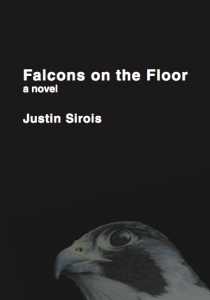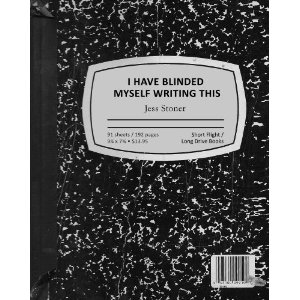We’re super stoked about what’s happening tomorrow, April 18, at 7 p.m. at Domy, y’all—Jess Stoner and Justin Sirois are reading from their new books, neither of which we could put down. Jess’s I Have Blinded Myself Writing This is a striking work of fiction that explores memory, telling the story of a woman who loses part of her past each time her body needs to heal a wound in the present. Justin’s Falcons on the Floor is a war story that “rehumanizes everyone involved,”says Dahr Jamail. The novel follows Salim and Khalil on the eve of the first siege of Fallujah—and we see why their decision to flee up the Euphrates river may not have been the best one.
We talked to both authors about their readings so far, and the experience doing the indie lit book tour, which has included overwhelming generosity, tearing pages from books, and a Pez factory. Read all about it below, and see you on Wednesday?!
Jess, on the intersection of text and image and how she tries to convey that during her readings:
ASF: You have said that one of the (many) things that inspired I Have Blinded Myself Writing This was a fascination with the tension between text and image. In what ways is I Have Blinded Myself Writing This a result of exploring that tension?
Jess: I think memory was my way into that tension. Our memories are so dependent on our senses; we translate the images we’ve burned onto our various cortexes into manageable, understandable, chunks. That process seems very much connected to how we read text, how we make sense in general. But still, the primer is the visual. The image will always big-daddy—will always demand more attention than text. But I’m hypnotized by the way an image can be encouraged to cast a shadow. How it might, pages later, linger–on top of, through, underneath–text. Instead of trying to make image and text compete, I wanted the images in the book to warp, to infect, to influence how a reader understands the text.
ASF: Are there ways in which it is hard to translate or convey the visual aspects of the book through a reading?
Jess: Definitely. I have to bring my trusty, ancient overhead projector to each reading, because I think that a performance of the book without certain visuals does a kind of disservice to the experience of the book. It’s not just the images that I think need to be projected though; I use transparencies of pages in the book that only feature text during readings as well, because I want the audience to have that disrupted experience: of “looking” at something, while they’re processing something else (the words I’m reading). In some ways, I guess I also want the audience, even if they don’t buy the book, well, I want to change how they remember it. It matters very much to me, the idea that the narrator wrote this book. I don’t want the audience’s memory of the reading to be me. I want what they see and hear to leave an impression, like the engram, the shadow the memory leaves in your brain. I want that to be an amalgam of what they’ve heard and what they’ve seen and to imprint their memory.
ASF: Along the same vein, you recently wrote a blog post about selectively buying certain books on your Kindle versus in print, and vice versa. Do you think there are certain books, like I Have Blinded Myself Writing This, which need to be read in print form to be fully appreciated?
Jess: I love my Kindle, like I want to french kiss it. I mean, I no longer have to stop reading while I’m changing a tampon. But I also hoard book-books. I don’t love the books less that I’ve only read on the Kindle. The difference is, as I read book-books, I write all over them; I’m marginalia obsessed. I want to remember what it was like the first time I read them. So when I go back to them, I can see who I was when I read them. My earnest hope is that readers of my book rip the pages; and if they go back to the book afterwards, they can’t read the book the same way again. That’s what’s meant to happen. That’s what happens when memories are lost.
I feel sad in some ways that this book can’t be for the Kindle—the potential energy, knowing you’re instructed to rip pages, couldn’t exist in the e-version. A version of that might be if the book was an editable PDF; like you could delete that page. I would love that. But the problem with that is, where’s the record? But that’s as close as it gets to losing your memory, I suppose.
ASF: What kind of reception have you received at your readings/elsewhere for your work, what have been the most surprising and exciting moments of your book tour so far?
Jess: My favorite reaction so far has been when I ask people to rip pages in the book. I find their hesitancy beautiful and wondrous and it breaks my heart and uplifts it simultaneously as they do what I ask them, publicly, to do: destroy the book.
 Justin, on his favorite book tour moments, reading without his collaborator, and if Texans see Falcons on the Floor differently than Marylanders:
Justin, on his favorite book tour moments, reading without his collaborator, and if Texans see Falcons on the Floor differently than Marylanders:
ASF: Falcons on the Floor was a collaborative effort with Iraqi refugee Haneen Alshujairy. Since she is unable to participate directly in the experience of readings and promoting the novel, in what ways do you try to include her presence or show her contribution at your readings?
Justin: Haneen really can’t participate in the readings, but we do have a page named “ask Haneen” where we’ve asked writers to ask her a question of their own. Authors from Michael Kimball to Lily Hoang to Paula Bomer have participated. We’re going to run the Q&A throughout the month of April and into May.
ASF: Do you feel as if the questions and reactions your novel has inspired have been different based on where you are in the country—for example, Texas versus Maryland?
Justin: Not really. Falcons on the Floor doesn’t take sides, or at least, in writing the novel, I tried my hardest not to pass judgment on the conflict. I do expect to get some negative reactions sooner or later; Khalil, one of the two main characters, helps members of the uprising bury IEDs. Although he is just doing this for the money, it is a profoundly criminal act in the eyes of the Coalition. I can imagine someone might be offended by that. Understandably so.
ASF: What kind of reception have you received at your readings/elsewhere for your work, what have been the most surprising and exciting moments of your book tour so far?
Justin: The tour has been great, really. One of the best things about the indie lit world is you can travel to pretty much any major city and have a network of support. So I guess I’ve been surprised by the generosity of everyone—how much they are willing to help with setting up readings and places for me to sleep. Oh, there was this Pez factory and museum that my pal and I stumbled upon driving back from Northampton. That was a great surprise.
